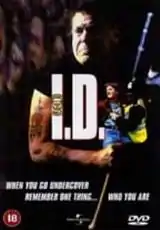I.D. (1995 film)
I.D. is a 1995 British-German film made by BBC Films about football hooliganism, directed by Philip Davis, written by Vincent O'Connell, and starring Reece Dinsdale, Sean Pertwee and Warren Clarke. It is set in the 1980s, in England, mainly London, and also shot at Millmoor and Valley Parade football grounds in Rotherham and Bradford respectively. The tagline is "When you go undercover, remember one thing... Who you are." The true events that inspired the movie are chronicled in the 2013 book Running with the Firm written by former undercover detective James Bannon. The film has a cult following, which has led to plans for the creation of an I.D themed pub in East London
| I.D. | |
|---|---|
 | |
| Directed by | Philip Davis |
| Produced by | Sally Hibbin |
| Screenplay by | Vincent O'Connell |
| Story by | James Bannon |
| Starring | Reece Dinsdale Warren Clarke Claire Skinner |
| Music by | Will Gregory |
| Cinematography | Thomas Mauch |
| Edited by | Inge Behrens |
Production company | |
| Distributed by | PolyGram Filmed Entertainment |
Release date |
|
Running time | 107 minutes |
| Country | United Kingdom Germany |
| Language | English |
Plot
John (Reece Dinsdale), an ambitious young police officer, is sent undercover to join a violent football firm associated with the fictitious club Shadwell Town to track down the 'generals' - the shadowy figures who orchestrate the violence. His team of four gradually ingratiate themselves into the lives of The Dogs, the nickname that Shadwell's fans give themselves. The main site for this is The Rock, a public house around which The Dogs' lives revolve. Gradually, the hard drinking and hard fighting macho culture - where Saturday's match and Saturday's fight are all that matters - prove strangely irresistible to John and he slowly finds himself becoming one of the thugs he has been sent to entrap.
His relationships with his wife, his superiors and even his team become strained. Eventually his wife returns to her parents' house and rebuffs his attempted reconciliation.
The police operation is abruptly wound up for budgeting reasons, just as it seems John is making progress in identifying those who pull the strings. The closing sequence shows a shaven-headed John taking part in a march. Trevor approaches him to try to help him, but is rebuffed. John says that he is, again, working undercover. There is a degree of ambiguity. His chanting at the very end makes it clear that whatever the truth, John is unable to prevent himself from sinking into his character.
The film features the fictitious teams of Shadwell Town and Wapping FC. The locations the teams are based on are real – they are neighbouring areas on the northern bank of the River Thames in London's traditional East End. It is believed that Millwall F.C was the inspiration for one team,[1] as the clubs' fans had a long-standing reputation for violence during the period which the film represents. Another possible parallel is that Shadwell are promoted to the First Division for the first time in their history towards the end of the film - Millwall were promoted to the top flight of English for the first time at the end of the 1987-88 season.
A sequel, with the title of ID2: Shadwell Army was released in August 2016. It was directed by Joel Novoa, and was written by Vincent O'Connell.[2][3]
Cast
- Reece Dinsdale as John
- Richard Graham as Trevor
- Perry Fenwick as Eddie
- Philip Glenister as Charlie
- Warren Clarke as Bob
- Claire Skinner as Marie
- Saskia Reeves as Lynda
- Sean Pertwee as Martin
- Charles De'Ath as Nik
- Lee Ross as Gumbo
- Terry Cole as Puff
- Steve Sweeney as Vinny
- Nicholas Bailey as Micky
- Nick Bartlett as David Daley
- David Schaal as Paul Funnell
- Alan Cooke as Wynton Mbula
- Peter Blythe as DAC Evans
- Ian Redford as DI Schofield
- Mark Burdis and Jamie Foreman as Previous Team
- Graham Camball as Licensing Officer
- Max Smith as Tyneburn policeman
- Philip Davis as Duty Sergeant
References
- O’Connell, Vincent. "ID". Retrieved 5 March 2017.
- "ID2: Shadwell Army": at the BFI. Retrieved March 19 2019
- "Vincent O'Connell ": at the BFI. Retrieved March 19 2019